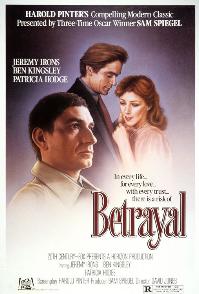Betrayal (1983 film)
| Betrayal | |
|---|---|
 Theatrical release poster | |
| Directed by | David Jones |
| Screenplay by | Harold Pinter |
| Based on | Betrayal by Harold Pinter |
| Produced by | Sam Spiegel |
| Starring | |
| Cinematography | Mike Fash |
| Edited by | John Bloom |
| Music by | Dominic Muldowney |
Production company | |
| Distributed by | Virgin Films |
Release date |
|
Running time | 95 minutes |
| Country | United Kingdom |
| Language | English |
Betrayal is a 1983 British
Plot
This article needs an improved plot summary. (June 2015) |
Betrayal follows significant moments in the seven-year extramarital affair of art gallery owner Emma with literary agent Jerry, the best friend of her husband Robert, a London publisher. Nine sequences are shown in reverse chronological order with Emma and Jerry meeting for the first time at the conclusion of the film.
Cast
- Jeremy Irons as Jerry
- Ben Kingsley as Robert
- Patricia Hodge as Emma
- Avril Elgar as Mrs. Banks
- Ray Marioni as Waiter
- Caspar Norman as Sam
- Chloe Billington as Charlotte, age five
- Hannah Davies as Charlotte, age nine
- Michael König as Ned, age two
- Alexander McIntosh as Ned, age five
Production
Screenwriter Harold Pinter based the drama on his seven-year (1962–69) clandestine affair with television presenter Joan Bakewell, who was married to producer-director Michael Bakewell. At the time, Pinter was married to actress Vivien Merchant.[2][3]
Reception
Dave Kehr of the Chicago Reader, by contrast, argued that "The reverse-order gimmick of Harold Pinter's screenplay seems meant to revitalize some trite and tedious material—the breakup of a love affair—yet the expected literary games don't materialize: the film plods backward in time with the same dull linearity it would have moving forward." He praised Kingsley's performance but gave the film an overall negative assessment.[6] Geoff Andrew likewise wrote in Time Out, "Hodge is fine, Kingsley tries his best, and Irons is as tight-assed as ever. But it's all so uncinematic as to make one wonder why it was ever made in the first place."[7] Variety commented that Patricia Hodge gave a much less compelling performance than the other two leads but summed up the film as "an absorbing, quietly amusing chamber drama for those attuned to Harold Pinter’s way with words."[8]
Accolades
| Award | Category | Nominee(s) | Result |
|---|---|---|---|
| Academy Awards[9] | Best Adapted Screenplay | Harold Pinter | Nominated |
| British Academy Film Awards[10] | Best Adapted Screenplay | Nominated | |
| Evening Standard British Film Awards | Best Actor | Ben Kingsley | Won |
| National Board of Review Awards[11] | Best Film | Won[a] | |
| Top Ten Films | Won[b] | ||
Notes
- ^ Tied with Terms of Endearment.
- ^ Tied with Terms of Endearment.
References
- ^ Susan Hollis Merritt, Pinter in Play: Critical Strategies and the Plays of Harold Pinter (1990; Durham and London: Duke UP, 1995) 236, 300. The first film reviews of such New York commercial screenings cited by Merritt date from 20 February 1983 (236-39).
- Faber and Faber, 2007) 264–67.
- ISBN 0-340-82310-0. (Two chapters deal with the relationship and affair with Pinter.)
- ^ Canby, Vincent (February 20, 1983). "Pinter's 'Betrayal,' Directed by David Jones". The New York Times. Archived from the original on January 30, 2013. Retrieved February 7, 2009.
- ^ Ebert, Roger (March 18, 1983). "Betrayal Movie Review". RogerEbert.com. Retrieved 21 January 2021.
- ^ Kehr, Dave (8 July 1985). "Betrayal". Chicago Reader. Retrieved 21 January 2021.
- ^ Andrew, Geoff. "Betrayal". Time Out. Archived from the original on August 11, 2020.
- ^ "Betrayal". Variety. December 31, 1982. Retrieved 22 January 2021.
- ^ "The 56th Academy Awards (1984) Nominees and Winners". oscars.org. Archived from the original on November 2, 2017. Retrieved 2011-10-09.
- BAFTA. 1984. Retrieved June 3, 2021.
- ^ "1983 Award Winners". National Board of Review. Retrieved July 5, 2021.
External links
- Betrayal at IMDb
- Betrayal at Rotten Tomatoes
